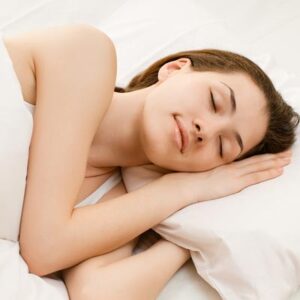SLEEP APNEA TREATMENT EDISON NJ
Ending Your Sleep Troubles with Orthodontic Care and Correction

At Smile Solutions Orthodontics, we understand the importance of restful, uninterrupted sleep in maintaining your overall well-being. That’s why we’re here to shed light on sleep apnea treatment in Edison, Millburn, and Union, NJ and offer you effective solutions through trusted and expert orthodontic care.
What Is Sleep Apnea?
Sleep apnea is a mysterious condition that often goes undetected, yet it can significantly impact your quality of life. To truly understand it, you need to know its fundamentals:
The Silent Intruder: Imagine this—you’re peacefully drifting off into dreamland when suddenly, your body decides to hit the pause button on your breath. It’s as if a glitch in your sleep pattern interrupts the natural rhythm of inhaling and exhaling. This unexpected pause, no matter how brief, is what defines sleep apnea.
The Culprit: The root cause of sleep apnea lies in the way your throat muscles behave while you’re in the land of dreams. As you relax into slumber, these muscles can become too lax, obstructing your airway and causing a momentary cessation of breathing.
But why does this matter? How does it affect you?
Symptoms and Dangers
Sleep apnea can be sneaky. It might not always be easy to spot, but your body might be trying to tell you something. Here are some signs to keep an eye out for:
- Loud Snoring: If you’ve been told your snoring can be heard from across the house, it could be linked to sleep apnea.
- Scary Awakenings: Imagine waking up suddenly, feeling like you can’t catch your breath or like something’s stuck in your throat. That’s what can happen with sleep apnea.
- Morning Exhaustion: Even after what seems like a full night’s sleep, you might wake up feeling super tired.
- Mood Swings: You might notice yourself feeling more grumpy or sad than usual.
- Middle-of-the-Night Surprises: You might not remember waking up, but your family might tell you that you do.
- Breathing Pauses: Someone who sleeps nearby might see moments when you stop breathing for a short time.
Now, why is it important to pay attention to these signs? Well, here are a couple of reasons:
- Safety First: Sleepiness caused by sleep apnea can make it risky to drive or operate machinery, leading to accidents.
- Heart Health: Sleep apnea can also affect your heart, increasing the chances of problems like high blood pressure and heart attacks.
Available Sleep Apnea Treatment Options in Edison, Union, & Millburn, NJ
At Smile Solutions Orthodontics, we take sleep apnea seriously and offer a range of sleep apnea treatment Edison NJ options to fit your needs.
Conservative Treatments
We start with gentle, non-medical options. These include things like nasal rinses, decongestants, and special sprays. They’re simple and can make a big difference for some people. Other conservative methods include:
- Weight Loss: If you have extra weight or obesity, shedding just 10% of your body weight can make a big difference in improving sleep apnea.
- Sleep Position and Aids: Changing how you sleep can help. Sleeping on your back can make sleep apnea worse, so using special pillows or supports can keep you off your back and prevent your throat from getting blocked.
- Treating Other Health Issues: If you have conditions like heart failure, getting treatment for them can sometimes improve central sleep apnea.
- Medication Adjustments: Talk to your doctor about any opioid pain medications you’re taking. Adjusting or stopping them, under medical guidance, might help improve or even resolve central sleep apnea.
CPAP Machines
The Continuous Positive Airway Pressure (CPAP) machine is a reliable option. It’s like a gentle breeze that helps keep your airway open while you sleep. For many, it’s a game-changer.
Intraoral Devices
If the CPAP isn’t your cup of tea, we have another trick up our sleeve. Intraoral devices are like custom-made mouthguards. They gently move your jaw forward, creating more space in your throat to breathe better. You wear them only at night while sleeping, and they can work wonders.
Surgery
In some cases, we may recommend surgery to remove things like tonsils and adenoids that might be causing obstructions. It’s a last resort, but it can be highly effective. Other surgery options include:
- Somnoplasty: This innovative procedure utilizes radiofrequency (RF) technology to target and shrink soft tissues around the upper parts of your windpipe, alleviating the factors contributing to sleep apnea.
- Tonsillectomy/Adenoidectomy: Particularly beneficial for children with obstructive sleep apnea, this surgical approach involves the removal of tonsils and adenoids, as mentioned above. The procedure widens the passage connecting your mouth, throat, and nasal passages, making it easier for air to flow through and reducing the presence of obstructive soft tissues.
- Uvulopalatopharyngoplasty (UPPP): UPPP is a surgical intervention that targets specific areas in the throat. During the procedure, your uvula (the teardrop-shaped soft tissue at the back of your mouth) is removed to facilitate smoother airflow. Additionally, excess soft tissue is excised from the soft palate and pharynx, effectively widening the space where your mouth and throat converge.
- Jaw Surgery: For individuals whose sleep apnea stems from structural factors, such as micrognathia (a condition characterized by a small lower jaw), jaw surgery offers a solution.
- Nasal Surgery: Septoplasty is a common form of nasal surgery aimed at straightening the soft tissue within the nose. It can enhance the airflow through your nasal passages, making it easier for air to travel freely.
Remember, your path to better sleep and health is unique. We’ll work with you to find the right solution that fits your needs and preferences. In the end, it’s all about helping you enjoy peaceful, uninterrupted nights and a healthier tomorrow.
How to Take Care of Yourself and Manage Symptoms
Managing sleep apnea is an ongoing journey that involves a combination of treatments, lifestyle adjustments, and self-care. At Smile Solutions Orthodontics, our specialists are committed to guiding you and providing the support you need to achieve long-term well-being.
THE IMPORTANCE OF TIMELY TREATMENT
Early diagnosis and effective management of sleep apnea can yield transformative results. With Smile Solutions Orthodontics, you can expect:
- Personalized Care
- Comprehensive Solutions
- Ongoing Support
Embracing a Brighter Future with Smile Solutions Orthodontics
Your journey to better sleep starts with a consultation at Smile Solutions Orthodontics. Our team of dedicated professionals is eager to help you regain control of your sleep and get the most out of your everyday life.

